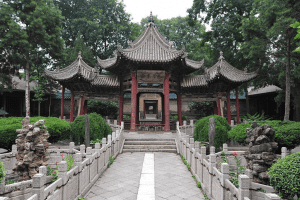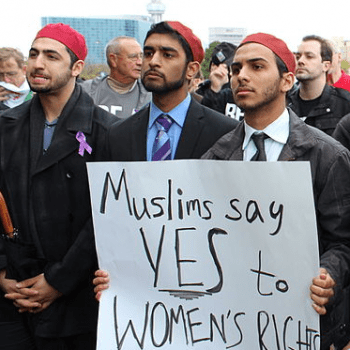I embraced Islam in China some 30 years ago. The Chinese Muslim community embraced me with open arms, laying a foundation of fond memories, and a life long interest in the Chinese Muslim community. More important, I learned from them three invaluable lessons.
The Many Ways of Being Muslim
 The first was that there is not just one way to be Muslim. I learned this from a soccer team from XinJiang who I met in a hole-in-the-wall halal restaurant in Beijing. They were jubilant to meet an American convert and insisted upon toasting me with chicken knuckles and lots of beer. At the time I was totally confused. These guys were clearly sincere Muslims who loved Islam, but I had learned that all alcohol is strictly forbidden by the Qur’an. I swallowed my religious reservations and a whole bottle of beer, despite the fact that I dislike the taste of it. Score one for international relations and religious tolerance!
The first was that there is not just one way to be Muslim. I learned this from a soccer team from XinJiang who I met in a hole-in-the-wall halal restaurant in Beijing. They were jubilant to meet an American convert and insisted upon toasting me with chicken knuckles and lots of beer. At the time I was totally confused. These guys were clearly sincere Muslims who loved Islam, but I had learned that all alcohol is strictly forbidden by the Qur’an. I swallowed my religious reservations and a whole bottle of beer, despite the fact that I dislike the taste of it. Score one for international relations and religious tolerance!
Since that day, I have embraced the fact that there are as many right ways of being Muslim as there are Muslims. It was only much later that I learned there are differences of opinion about alcohol, not just among soccer players, but the classical imams as well. Interestingly enough, anecdotal stories claim the first Muslims to meet the Uighurs told them they could be Hanafi or Hanbali, and they chose Hanafi since the school allowed drinking any alcohol not made of grapes or dates.
Separate is Never Equal
The second lesson was that segregation never leads to equality. In Xian, I had the privilege of praying at one of China’s famous “nu si” — mosques which are run by women for women, with women imams and all female congregations. It was a fabulous experience, one that inspired my journey into leadership within Islam, following in the steps of the remarkable female imam who led that mosque. I still treasure my long conversation with her and the prayer rug that the women of the nu si gave me, but more valuable was the lesson that though women’s mosques may be a step toward empowerment and a means to build female leadership, in the end segregation is always a trap.
 Indeed, the only reason I had found the women’s mosque was because the men at the main mosque – a stunningly beautiful Chinese style temple completed a few decades after the Prophet’s death with garden courtyards, a pagoda style minaret, fountains for wudu, and an amazing prayer hall decorated with the Qur’an in Arabic and classical Chinese — refused to let me pray jum’a there, even though a few days earlier I had toured the complex with a mixed gender group of students. The clear message as they impatiently shooed me out was we have no space for women and no use for them in religious matters.
Indeed, the only reason I had found the women’s mosque was because the men at the main mosque – a stunningly beautiful Chinese style temple completed a few decades after the Prophet’s death with garden courtyards, a pagoda style minaret, fountains for wudu, and an amazing prayer hall decorated with the Qur’an in Arabic and classical Chinese — refused to let me pray jum’a there, even though a few days earlier I had toured the complex with a mixed gender group of students. The clear message as they impatiently shooed me out was we have no space for women and no use for them in religious matters.
In stark contrast, the women’s mosque was far from beautiful. It was a small, drab unmarked building with several rooms. The walls were decorated with faded paint, white on the top half of the walls and a sickly green on the bottom half. The floors were bare, worn concrete. The women who came to pray juma that day had to bring their own rugs to pray on. Wudu was made at stained sinks with cold water only. And the toileting system was the worst I have ever used.
The imam of the mosque was an elderly woman with a thorough knowledge of Qur’an and Arabic. She lived in one of the rooms on the second floor. It too was bare and plain, and despite the women’s great respect for her, she lived in complete penury. Of course, the men never came to learn from her, though she was well-educated, and as wise and filled with God’s love as any Muslim I have ever met. Women’s religious knowledge, as far as they were concerned, was of no interest or value to men, only to other woman. Naturally, they would never think to come pray behind a female imam or to let her lead them in the main mosque.
There are many modern feminist Muslims who look to the women’s mosque as a model to achieve power and equity, but my experience at the nu si in Xian taught me that separate mosques do not end inequality, and only lead to other forms of dis-empowerment and discrimination. They may be a stepping stone, a safe space for women to learn and practice leadership, but in the end equality is only found when everyone in society is welcome to participate on an equal footing.
Don’t Take Your Religious Freedom For Granted
The final lesson was perhaps the most important lesson of all, and it was taught to me by the imam of the women’s mosque. She shared the history of religious persecution experienced by her family and perpetrated against the Muslims of China by the Communist government. I had known about the disfiguring of Buddhist sculptures and the destruction of Doaist temples, the torture and murder of nuns and priests of all faiths, self-criticism and re-education camps designed to turn believes into atheists. But the extent to which Mao and the rulers following him had oppressed people of faith didn’t really sink in until she told me what had happened to her family.
She told me how her husband had been sent to a camp and they never saw him again. How her children had been sent to different cities for school, and travel permits to visit one another denied. How Muslims interested in religious scholarship had to attend state-run imam schools, and to attend those schools you had to be a Communist, which meant adhering to the state policy of atheism, which, obviously, was in direct contradiction to being an imam. How Muslims openly adhering to their religion were discriminated against in housing, healthcare, job selection, and educational access. How the government exported tens of thousands of party loyalists to Xin Jiang to dilute the culture and the faith community, much as they did in Tibet.
Most of the world is unaware of this campaign of conversion through coercion and attenuation. Most are unaware that it continues today, that reeducation camps where Muslims are forced to eat port and drink alcohol and chant anti-theist slogans hold an estimated 500,000 Uighur Muslims. And that this religious persecution is the main reason why Uighurs in Xin Jiang are resentful of the government and are increasingly radical in their opposition to remaining under Chinese control. The UN and powerful nations need to act to ensure freedom of conscience and faith in China and around the world. Our foreign policies need to understand the growing radicalization as a reaction to decades of persecution and a desire for the basic liberties we hold dear.
On a personal level, seeing and hearing first hand the intense religious persecution the Chinese people have lived with taught me to treasure the Constitution’s enshrinement of religious freedom and the right to live according to one’s own conscience. Islamophobia and the rise of a Christian right that wants to impose their faith and values on us all are a threat to those freedoms. I can’t imagine that US will ever get as bad as Maoist China was, but it’s still up to those of us who take religious freedom and freedom of conscience seriously to make sure it never does. We must reject candidates that run on a platform of instituting their personal religious values as the law of the land. We must even more firmly reject judicial candidates who lean toward incorporating Christian values into the law of the land. It’s not only unconstitutional, it’s inhumane.












